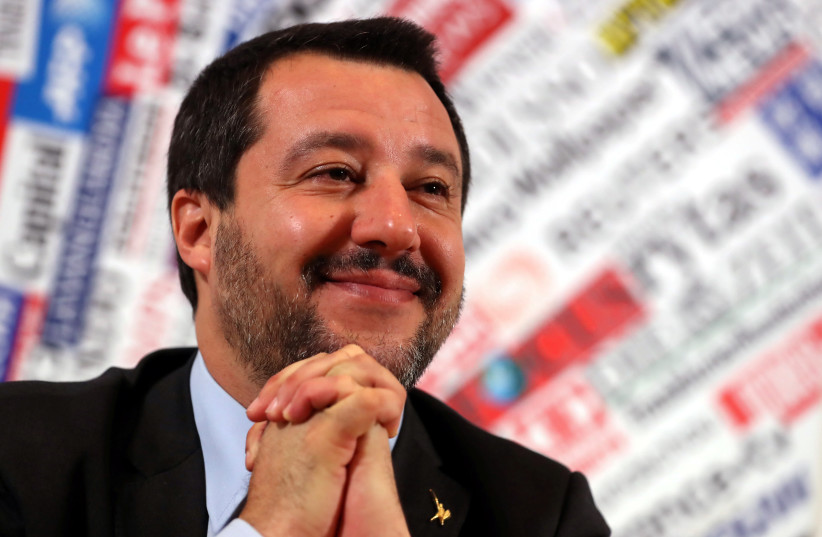 Italian opposition leader vows to recognize Jerusalem as capital if elected
Italian opposition leader vows to recognize Jerusalem as capital if elected
ROSSELLA TERCATIN
Matteo Salvini also discussed several issues, including the rise of antisemitism in Europe.

Italian opposition leader Matteo Salvini has vowed that if he is elected to head the government he will recognize Jerusalem as the capital of Israel.
Salvini is the head of the League party, which has been traditionally considered in the far-right spectrum of Italian politics. Still, it is also currently the largest right-wing party in the Italian Parliament and by far the largest party in general according to polls conducted in the past year – League regularly polls above 30%.
In an interview with the Israeli daily Israel Hayom, Salvini explicitly stated that if he becomes prime minister, he will “absolutely” recognize Jerusalem as Israel’s capital.
The Italian politician also discussed several issues, including the rise of antisemitism in Europe.
“I think that it has to do with the strengthening of Islamic extremism and fanaticism in the last years. Most importantly, it is connected to the fact that some academics and media are mobilized against Israel, and they create hate of Israel to justify antisemitism. There is, of course, antisemitism of small political minority groups – Nazis and communists. But, now the massive presence in Europe of migrants coming from Muslim countries, among whom are many fanatics who are getting the full support of certain intellectuals, is spreading antisemitism, in Italy as well,” Salvini said.
He also rejected the accusations of being close to Italian small far-right parties, which do not even bother to conceal to be inspired by fascist ideals, such as CasaPound.
“We [Lega] have no relations whatsoever with such organizations. In the elections, parties like Forza Nuova, CasaPound, Fiamma are running against us. So there are no contacts with them. Those who believe in Neo-Nazi and Neo–fascist antisemitism are our enemies as those who believe in the antisemitism of the radical left and radical Islam,” he highlighted.
On Thursday Salvini organized a conference on fighting antisemitism at the Senate in Rome, two months after he and all the right camp in Italy sparked outrage among many, including Italian Jewish leaders, for refraining from supporting the establishment of a parliamentary commission to fight antisemitism and racism proposed by 89-year-old Auschwitz survivor and senator for life Liliana Segre.
After the episode, Salvini and Segre met, and he invited her to participate in the event at the senate. She declined because of her tight schedule in the period of Holocaust Memorial Day, which falls on January 27 and is very felt in Italy. However, Segre also warned of the risk of trying to separate antisemitism from racism.
During the event, Salvini also called on the Italian government, currently supported by a coalition made by its former government ally, the anti-system 5-Star-Movement, and by the center-left Democratic Party (plus some smaller formations), to adopt the definition of antisemitism proposed by the International Holocaust Remembrance Alliance.
The definition explicitly describes denial of the Jewish people’s right to self-determination and comparisons between Israel and the Nazis as forms of antisemitism.
The Italian government adopted the definition on the very same day and appointed a commissioner to fight antisemitism, in a move that had been pursued for a long time also by local Jewish leaders.
The Italian Jewish community’s tiny number (less than 30,000 people) does not make them a factor in deciding election results. Nonetheless, there are several issues for which Jewish institutions are considered an essential partner by Italian authorities, including the remembrance of the Holocaust and the fight against intolerance and racism. A 2013 survey suggested that the majority of Italian Jews identify as center-right or right-wing.
However, even among them, many feel uncomfortable with Salvini’s attitude, considered anti-immigration and populist, in spite of his support for Israel.
In the interview, Salvini said that the fight against hate towards Israel “should start in school.”
“I spent nine years at the European Parliament and I can say that the European institutions – let alone the institutions the UN – are no friends of Israel. The European Parliament has today a majority that is not friendly to Israel. So, I believe we shouldn’t focus on these institutions but rather on the new generations. Those who want to erase the State of Israel should know that they will have in us an enemy. Israel is an ally. This should be taught in schools and universities,” he told Israel Hayom.
He also stated that the EU should ban the BDS movement and join the US in issuing harsher sanctions against Iran.
“To do so we would need a strong and free Europe because nowadays we are unfortunately hostage of economic interests and leftist prejudices that is anti–US and anti–Israel,” he explained.
Zawartość publikowanych artykułów i materiałów nie reprezentuje poglądów ani opinii Reunion’68,
ani też webmastera Blogu Reunion’68, chyba ze jest to wyraźnie zaznaczone.
Twoje uwagi, linki, własne artykuły lub wiadomości prześlij na adres:
webmaster@reunion68.com
